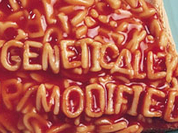Mystery of Christ's Wounds
Stigmata appeared for the first time on the hands of the founder of the Franciskan order, St. Francis
Mental processes, emotions and feelings are closely connected with the human body. The interaction of 'body and soul' is exposed most explicitly on human skin. The phenomenon of stigmata is still considered a religious enigma. However, one may say there are a lot of religious people, whose hands may start bleeding on religious holidays, particularly during The Passion.  “In Christian mysticism, bodily marks, scars, or pains suffered in places corresponding to those of the crucified Jesus—on the hands and feet, near the heart, and sometimes on the head (from the crown of thorns) or shoulders and back (from carrying the cross and being whipped),” Encyclopedia Britannica says.
“In Christian mysticism, bodily marks, scars, or pains suffered in places corresponding to those of the crucified Jesus—on the hands and feet, near the heart, and sometimes on the head (from the crown of thorns) or shoulders and back (from carrying the cross and being whipped),” Encyclopedia Britannica says.
The phenomenon appeared long ago. At the end of the 19th century doctors examined Louise Lato – bleeding wounds appeared on her hands during religious holidays for no particular reason. Doctors put a sealed bondage on one of the girl's hands prior to a religious holiday. The bondage was removed on Good Friday – members of the Belgian Academy of Sciences saw bleeding ulcers on the girl's hand.
Teresa Neiman (deceased in 1962) was kept under profound medical supervision for a very long time. Teresa was suffering from Christ's Wounds too: blood would start flowing spontaneously, causing terrible pain to the woman. Wounds would then heal up in a week without scarring. Furthermore, the woman was suffering from bloody tears and bloody sweat.
As it is known from the history of religion, stigmata appeared for the first time on the hands of the founder of the Franciskan order, St. Francis (1182-1226). Over 300 cases have been described since then. It is noteworthy, religion is not the only ground that causes stigmata to appear. Writers may suffer from them at times too, when they become too much preoccupied with their own characters. Charles Dickens wrote, for instance, that his face had swollen when he was working on the story “The Chimes.” Soviet writer Maxim Gorky fainted, when he was writing a scene, in which a jealous husband stabs his wife in the liver. A bleeding wound soon appeared on Maxim Gorky's body, in the area of his liver.
Mysterious bodily wounds may appear, if relatives endure too much of their relatives' sufferings. A sister witnessed her brother being whipped – her back was then covered with bleeding scars reminiscent of her brother's. The fact was officially documented. Doctor Faivishevsky described similar occurrences with women, who were forced to witness their children being beaten.
Stigmatization as a result of nightmares has also been described in medical literature. A medical college student attended the autopsy procedure for the first time in her life. The next day she said she had had a very bad dream, in which the dead man was choking her and grabbing her hands, trying to drag her away. When she woke up, she found her neck and wrists bruised. Doctor Kolbin described a child, who had lost his hair after a nightmare. The little boy had a dream, in which his grandfather rose from the casket and grabbed the boy's hair. The child had the nightmare several nights in a row, losing more and more of his hair.
The phenomenon of imaginary pregnancy is to be categorized as autosuggestion, when sterile women develop lipopexia on their stomachs, which in its turn incites adequate breast changes. “It comes from your head, your dreams, to influence such a quiet vegetative process as the augmentation of adipose tissue,” scientist I.Pavlov wrote.
Some experts believe stigmata appear due to brain activities, such as imagination. A religious fanatic may suffer from Christ's Wounds, if he or she thinks too much about the crucified Jesus. Writers may suffer from this bodily ailment if they share the suffering and pain of their own literature characters.
Doctor A. Lechner hypnotized a girl in 1993, having reproduced Christ's Wounds on her hands. Doctor A. Kartashev was keeping a female patient under his observation in 1936. In a state of hypnosis the woman had been convinced she had been taking quinine. Nettle-rash developed for the woman several hours after the seance. Bruises, frostbite, edema, rash and pigmentation are possible to be caused with hypnosis.
The above-mentioned story about the boy, who had lost his hair because of the nightmare, can also be classified as autosuggestion. A well-known Russian “psychotherapist” Anatoly Kashpirovsky was very popular in the USSR. He conducted healing sessions and seances for audiences numbering in millions on live Soviet television at the end of the 1980s. A girl's body was covered with hair as a result of one of such ‘healing sessions.’ One may assume Kashpirovsky caused a rough dysfunction of endocrine glands, which made hairs appear all over the girl's body. Kashripovsky claimed he did not use hypnosis in his session – he did not say the world ‘sleep,’ as he explained in an interview. One has to acknowledge, however, modern medicine does not identify hypnosis with sleep now. An up-to-date definition says hypnosis causes a state of constricted conscience, which may evolve not only as a result of a verbal influence. ‘Extrasensory individuals,’ ‘sorcerers’ and other ‘healers’ use the effect of autosuggestion in their practice. However, they do not think that hypnosis reminds the work of a surgeon. Putting a person in a hypnotic trance can be compared to an abdominal surgery. Just a cut on a patient's stomach does not determine the skills of a surgeon. The mastery of a psychotherapist implies the reasonable influence on a patient prepared to comprehend the medical treatment by suggestion. The diversity of this influence is similar to the diversity of illnesses. Complications are possible to occur when this condition is broken.
V. Lebedev
Doctor of psychological sciences
Subscribe to Pravda.Ru Telegram channel, Facebook, RSS!





